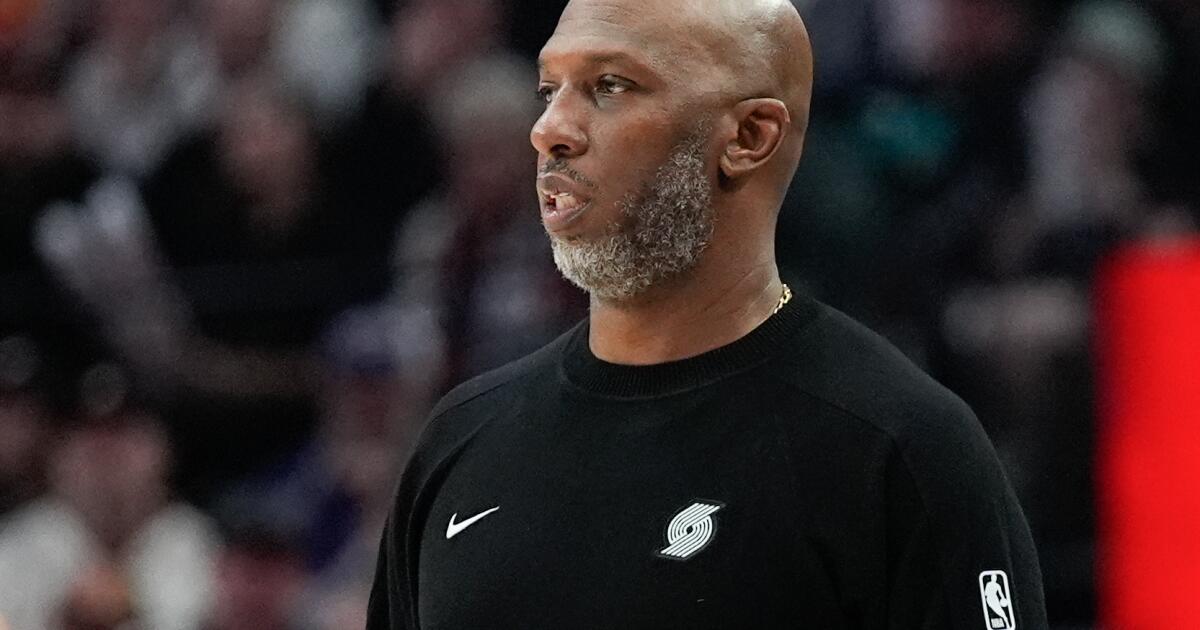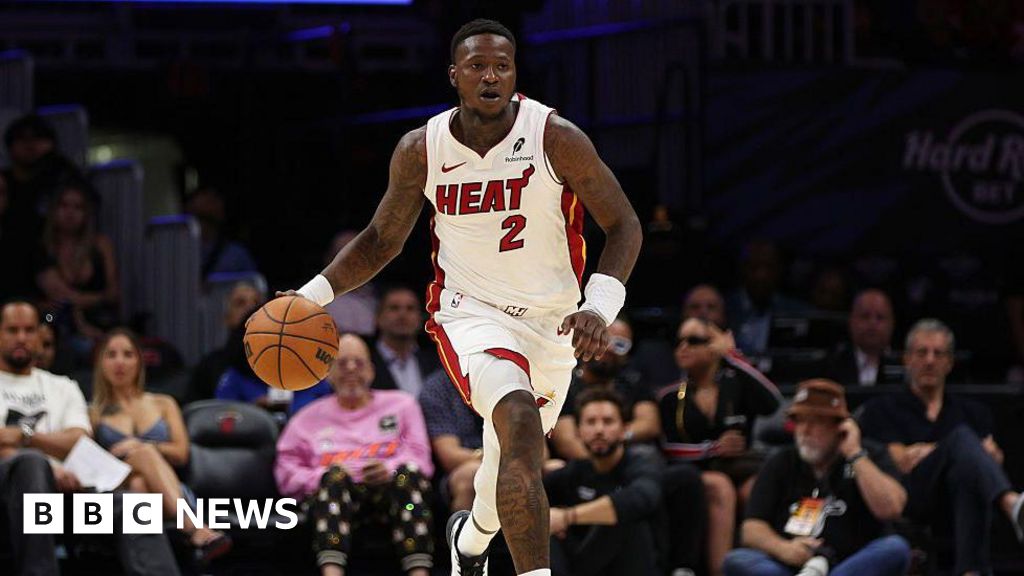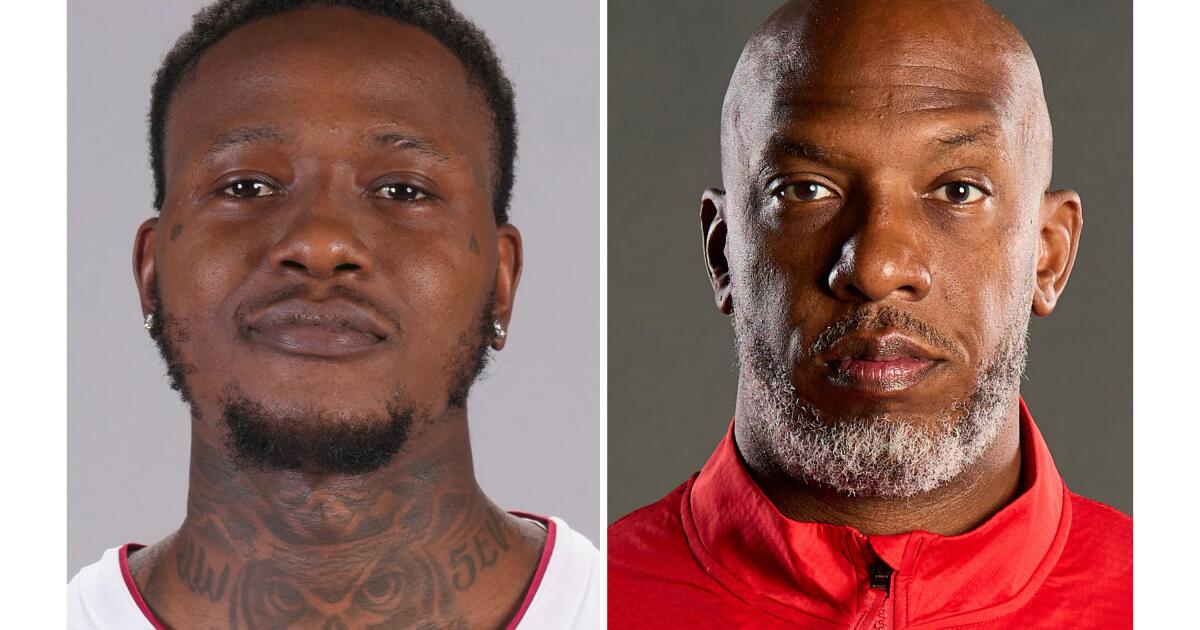Hiltzik: Whoever thought gambling would be good for sports?
I may be revealing a secret cherished by columnists the world over, but I admit that among the columns we relish writing the most fall into the “I told you so” genre.
Case in point: In April last year, in a column about the gambling mess ensnaring Shohei Ohtani’s then-interpreter, I warned that the pro sports leagues’ enthusiastic embrace of betting would inevitably produce a major scandal.
“It might not surface in the next months or even years,” I wrote, “but it will happen.”
Get a big bet on Milwaukee tonight.
— Damon Jones’ alleged message to gamblers after learning that LeBron James would be sitting out a Lakers-Bucks game
The calendar, as it turned out, ticked over at 19 months. Last Thursday, federal prosecutors charged National Basketball Assn. player Terry Rozier and former NBA player and assistant coach Damon Jones with fraud and money laundering in connection with a scheme to fix bets on NBA games. Portland Trail Blazers head coach Chauncey Billups was charged in a separate indictment linking him to a Mafia scheme to fix poker games; Jones was also named in that indictment.
The NBA has placed Billups and Rozier on leave. They’re both due to appear in federal court in Brooklyn over the next few weeks to enter pleas, though both have asserted their innocence.
It may not be easy for the league to wash its hands of this mess. All the professional sports leagues spent years shunning gambling as a threat to their public image of integrity before embracing the siren call of big-time sports betting, bringing gambling companies and their ever-increasing customer base into their tents. But the NBA was ahead of the crowd.
In a 2014 op-ed, NBA Commissioner Adam Silver effectively cried “uncle” in the league’s battle against gambling.
“For more than two decades,” he wrote, “the National Basketball Association has opposed the expansion of legal sports betting, as have the other major professional sports leagues in the United States.” The leagues supported a 1992 federal law prohibiting sports betting except in grandfathered venues, such as Las Vegas.
They took a stern position against players and personnel caught betting on their games and their sports, dating to 1919 and the so-called Black Sox scandal, in which eight members of the Chicago White Sox were accused of throwing the World Series for the benefit of a gambling ring. Major League Baseball hired an austere federal judge, Kenesaw Mountain Landis, as its commissioner and gave him unchecked authority to clean up the game. He banned the eight players from baseball forever.
In recent times, Silver observed in his op-ed, the American appetite for sports betting has only risen. Accordingly, he called for legalizing the practice so it could be “brought out of the underground and into the sunlight where it can be appropriately monitored and regulated.”
(The 1992 law was overturned by the Supreme Court, and legalized sports betting spread coast to coast.)
Given the subsequent developments, one can tag Silver for his childlike innocence in counting on the government to regulate an industry collecting billions of dollars a year from millions of users while operating with a legal imprimatur.
Silver wrote that among his “most important responsibilities as commissioner of the N.B.A. is to protect the integrity of professional basketball and preserve public confidence in the league and our sport.”
When I asked the NBA if Silver has had second thoughts about his 2014 op-ed, the league replied, “We continue to believe that a legal, regulated, and monitored sports betting market is far superior to an illegal one operating underground,” and suggested that a single federal regulator would be preferable to the existing state-by-state patchwork, though the activities alleged in the federal indictments almost surely would be crimes in any state. Silver did say during a broadcast interview Friday that the case gave him “a pit in my stomach.”
The league’s ability to monitor the behavior of its own people is questionable. Consider a March 23, 2024, Charlotte Hornets game against the New Orleans Pelicans. According to the indictment, Rozier let the gambling conspirators know that he would take himself out of the game early, allowing them to profit from bets that his stats would fall short of bookmakers’ expectations.
The NBA, alerted by sports wagering companies to “aberrational behavior” involving Rozier in the game, investigated but later said it could find any “violation of NBA rules.”
The NBA can hardly claim to have been blindsided by the new indictments. Only last year, another federal gambling case erupted involving NBA games.
In that case, prosecutors alleged that a gambler named Ammar Awawdeh forced then-Toronto Raptors player Jontay Porter to take himself out of a game early. That led gamblers who knew of the arrangement to bet that his stats for the game would fall short of expectations; those insiders made more than $100,000 on their bets, the prosecutors charged.
According to text messages filed with the 2024 indictments, Awawdeh acknowledged “forcing” Porter to participate in the scheme to help clear some of his gambling debts.
Awawdeh engaged in plea negotiations in the case, but the outcome couldn’t be determined. Porter pleaded guilty to related federal fraud charges, and is scheduled to be sentenced in December. The NBA has banned Porter for life.
Awawdeh was also named in last week’s indictment over the alleged poker scam.
In recent years, the pro leagues have cozied up to the gambling industry, claiming that their interest is merely “fan engagement” — that is, keeping TV viewers in front of their sets even during blowout games.
Only 11 states bar sports gambling today. They include the customary anti-gambling holdouts Utah and Hawaii, and California, where ballot measures to legalize sports gambling were defeated in 2022. As I mentioned in 2024, the perils of this expansion are manifest.
They’ve created a new underclass of gambling addicts while largely failing to fulfill their advocates’ assurances that state-sponsored and regulated gambling would produce a new, risk-free revenue stream for state and local budgets. The outcomes of some games have come under suspicion even where no evidence of fixing has been found.
The leagues have gone beyond just tolerating gambling; they’ve made partnership and sponsorship deals with the major sports gambling companies. The two leading companies, FanDuel and DraftKings, are official corporate gambling partners of the NBA, National Football League and Major League Baseball.
During broadcasts and steaming of games, it’s common to see in-game statistical projections on-screen — what are the chances of this hitter striking out, or hitting a home run, for instance.
During the seventh inning of Game 2 Saturday, Fox flashed a projection that there was a 36% chance that Yoshinobu Yamamoto would pitch 9+ innings. (He went the distance.)
The only reason to offer such projections is to feed the appetite for in-game proposition, or “prop,” bets. These are fundamentally bookmakers’ estimates. They don’t tell ordinary viewers anything they need to know to enjoy the coming innings, but do give bettors something to chew on before putting money down on the proposition “will Yamamoto pitch a complete game?”
In-game prop bets, as it happens, are like heroin to the vulnerable, offering instant gratification (or dismay). They “may be associated with risky gambling behavior,” according to the National Council on Problem Gaming. Draftkings heavily promotes prop bets on its sportsbook web page.
In a memo issued Monday, the NBA singled out prop bets as trouble spots: “In particular,” the memo says, “proposition bets on individual player performance involve heightened integrity concerns and require additional scrutiny.”
The major gaming companies have rolled out new ways to keep bettors betting. Smartphone apps, for example. In the old days no one could place a legal sports bet without traveling to Las Vegas, a built-in curb on problem gambling. Today, anyone with a smartphone can place a bet, often without certifying their age or financial resources.
“The advent of smartphones in 2007 and the Supreme Court decision in 2018 opened the door to fully frictionless, 24/7 legal gambling,” problem gambling experts Jonathan D. Cohen and Isaac Rose-Berman wrote recently.
I asked FanDuel and DraftKings if they accepted any responsibility for problem gaming in the U.S. DraftKings didn’t reply. A spokesman for FanDuel told me by email that the company “takes problem gambling seriously and continually works to identify at-risk behavior … including when a customer attempts to deposit significantly more than what they typically do,” or “excessive time on site, chasing losses or signals from customer service interactions.” In those cases, the company sometimes imposes deposit limits or timeouts or can exclude the user entirely.
That brings us to the latest indictments. The feds identified seven NBA games in 2023 and 2024, including the 2023 game in which Rozier allegedly tipped confederates to his decision to bench himself.
Among the others were a 2023 Trail Blazers game in which gamblers were tipped that the team would sit its best players so it would lose, thereby acquiring a better position in the upcoming NBA draft; and two Lakers games in which Jones allegedly tipped gamblers that star LeBron James, a friend since they played together on the Cleveland Cavaliers, was hurt and wouldn’t be playing.
“Get a big bet on Milwaukee tonight,” Jones allegedly told a contact before the first game, against the Milwaukee Bucks. James sat it out and the Lakers lost. James isn’t identified by name in the indictment, but its description of his roles helped identify him. James hasn’t made a public comment about the case, but he hasn’t been accused of any wrongdoing.
Can anything stem this tide? The smart bet at this moment is “no.” There’s just too much money riding on the continued expansion of sports betting: DraftKings has more than doubled its revenue since 2022, reaching $4.8 billion last year, and nearly doubling its monthly average users to 3.7 million. FanDuel is owned by a British gambling conglomerate, so its U.S. sports revenue is difficult to parse.
That’s a lot of money to be thrown around promoting more sports gambling, making it harder for governments to regulate and for sports leagues to turn up their noses at the income. Keeping their image for integrity intact in this world of greedy and needy players and voracious gamblers is only going to get harder.


